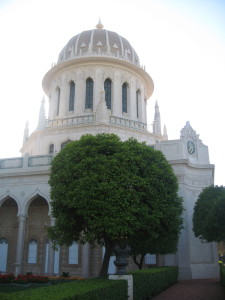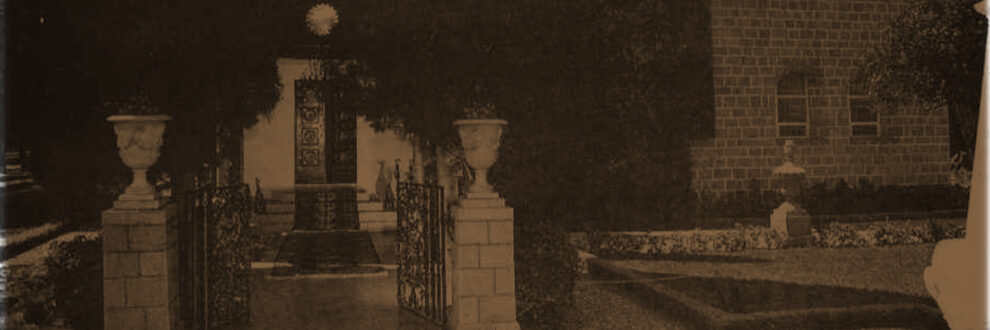 Jináb-i-Muníb
Jináb-i-Muníb
Born: Unknown
Death: Unknown
Place of Birth: Káshán, Iran
Location of Death: Smyrna, ancient city located on the Aegean coast of Anatolia
Burial Location: No cemetery details
His name was Mírzá Áqá and he was spirit itself. He came from Káshán. In the days of the Báb, he was drawn to the sweet savors of God; it was then he caught fire. He was a fine youth, handsome, full of charm and grace. He was a calligrapher second to none, a poet, and he had as well a remarkable singing voice. He was wise and perceptive; staunch in the Faith of God; a flame of God’s love, severed from all but God.
During the years when Bahá’u’lláh resided in Iraq, Jináb-i-Muníb left Káshán and hastened to His presence. He went to live in a small and humble house, barely managed to subsist, and set about committing to writing the words of God. On his brow, the bestowals of the Manifestation were clear to see. In all this mortal world he had only one possession, his daughter; and even his daughter he had left behind in Persia, as he hurried away to Iraq.
At the time when, with all pomp and ceremony, Bahá’u’lláh and His retinue departed from Baghdad, Jináb-i-Muníb accompanied the party on foot. The young man had been known in Persia for his easy and agreeable life and his love of pleasure; also for being somewhat soft and delicate, and used to having his own way. It is obvious what a person of this type endured, going on foot from Baghdad to Constantinople. Still, he gladly measured out the desert miles, and he spent his days and nights chanting prayers, communing with God and calling upon Him.
He was a close companion of mine on that journey. There were nights when we would walk, one to either side of the howdah of Bahá’u’lláh, and the joy we had defies description. Some of those nights he would sing poems; among them he would chant the odes of Háfiz, like the one that begins, “Come, let us scatter these roses, let us pour out this wine,” and that other:
To our King though we bow the knee,
We are kings of the morning star.
No changeable colors have we—
Red lions, black dragons we are!
The Blessed Beauty, at the time of His departure from Constantinople, directed Jináb-i-Muníb to return to Persia and promulgate the Faith. Accordingly he went back, and over a considerable period he rendered outstanding services, especially in Tihrán. Then he came again, from Persia to Adrianople, and entered the presence of Bahá’u’lláh, enjoying the privilege of attending upon Him. At the time of the greatest catastrophe, that is, the exile to ‘Akká, he was made a prisoner on this Pathway and traveled, by now feeble and ill, with the party of Bahá’u’lláh.
He had been stricken by a severe ailment and was pitifully weak. Still, he would not agree to remaining behind in Adrianople where he could receive treatment, because he wanted to sacrifice his life and fall at the feet of his Lord. We journeyed along till we reached the sea. He was now so feeble that it took three men to lift him and carry him onto the ship. Once he was on board, his condition grew so much worse that the captain insisted we put him off the ship, but because of our repeated pleas he waited till we reached Smyrna. In Smyrna, the captain addressed Colonel ‘Umar Bayk, the government agent who accompanied us, and told him: “If you don’t put him ashore, I will do it by force, because the ship will not accept passengers in this condition.”
We were compelled, then, to take Jináb-i-Muníb to the hospital at Smyrna. Weak as he was, unable to utter a word, he dragged himself to Bahá’u’lláh, lay down at His feet, and wept. On the countenance of Bahá’u’lláh as well, there was intense pain.
We carried Jináb-i-Muníb to the hospital, but the functionaries allowed us not more than one hour’s time. We laid him down on the bed; we laid his fair head on the pillow; we held him and kissed him many times. Then they forced us away. It is clear how we felt. Whenever I think of that moment, the tears come; my heart is heavy and I summon up the remembrance of what he was. A great man; infinitely wise, he was, steadfast, modest and grave; and there was no one like him for faith and certitude. In him the inner and outer perfections, the spiritual and physical, were joined together. That is why he could receive endless bounty and grace.
His grave is in Smyrna, but it is off by itself, and deserted. Whenever this can be done, the friends must search for it, and that neglected dust must be changed into a much-frequented shrine, so that pilgrims who visit there may breathe in the sweet scent of his last resting-place.
Source:
‘Abdu’l-Bahá. Memorials of the Faithful. Bahai.org.
Image:
(c) Baha’i Chronicles






